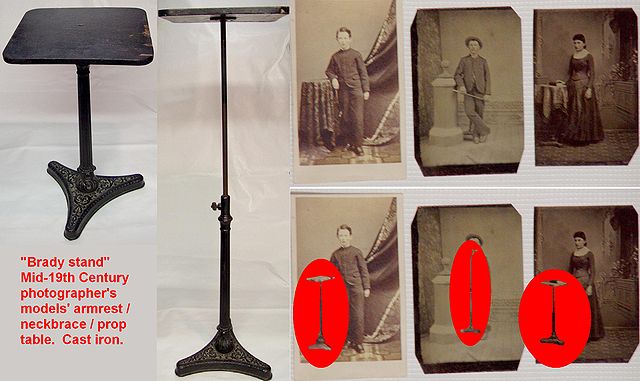 |
This is a file from the Wikimedia Commons. Information from its description page there is shown below.
Commons is a freely licensed media file repository. You can help.
|
Summary
| Description |
English: Cast iron "Brady stand" side table. As perhaps the best-known US photographer in the 19th century, it was Mathew Brady's name that came to be attached to the era's heavy specialized end tables which were factory-made specifically for use by portrait photographers. Such a "Brady stand" of the mid-19th century typically had a weighty cast iron base for stability, plus an adjustable-height single-column pipe leg for dual use as either a portrait model's armrest or (when fully extended and fitted with a brace attachment rather than the usual tabletop) as a neckrest. The latter was often needed to keep models steady during the longer exposure times of early photography. While Brady stand is a convenient term for these trade-specific articles of studio equipment, there is no proven connection between Brady himself and the Brady stand's invention circa 1855.A Brady stand is clearly visible in use in context in the late 19th century period novelty photo of a "photographer photographing himself" see Commons image: http://en.wikipedia.org/wiki/File:Photographer-studio-1893.jpg
Notes
- ↑ Macy, et al, "Macy Photographic Studio's Dispatch(, The)", Northampton MA, Spring-Summer 1913, pg 2
- ↑ ibid., pg 3
- ↑ ibid., pg 2
|
| Date |
26 October 2009 |
| Source |
Own work |
| Author |
Composite assembled by Cramyourspam, vintage photos by Anonymous 1864 photographer, Anonymous mid 19th century tintype photographer |
Permission
( Reusing this file) |
PD-retouched-user
|
Licensing
| Public domainPublic domainfalsefalse |
 |
I, the copyright holder of this work, release this work into the public domain. This applies worldwide.
In some countries this may not be legally possible; if so:
I grant anyone the right to use this work for any purpose, without any conditions, unless such conditions are required by law.Public domainPublic domainfalsefalse
|
File usage
The following pages on Schools Wikipedia link to this image (list may be incomplete):
SOS Childrens Villages has brought Wikipedia to the classroom. SOS Children works in 133 countries and territories across the globe, helps more than 62,000 children, and reaches over 2 million people in total. Will you help another child today?



